

Australian Citizen Science Project Finder. Digital Data Nuggets — DataClassroom. Education for sustainability - Google My Maps. Climate change: how your grass clippings can help track greenhouse gas levels. A climate scientist is asking volunteers to collect grass clippings so she can measure the changes in carbon dioxide as we move out of lockdown.
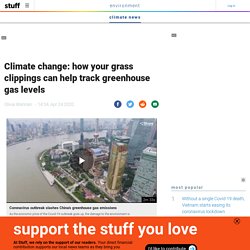
The country's air pollution and greenhouse gas output took a dive after our move into Alert Level 4 restrictions to fight Covid-19. Jocelyn Turnbull, a GNS Science carbon researcher, wants to measure the emissions changes as life returns to normal. But as the alert level restrictions prevent her team from measuring carbon dioxide by collecting air samples, she's turning to volunteers – and their nearby patches of grass – to help out.
Turnbull says plants constantly absorb carbon dioxide from the air to grow. What can you do with wind power? Neal Bent GIPENZ from ABB works with Erica, Warren and Bernie from Royal Road School.
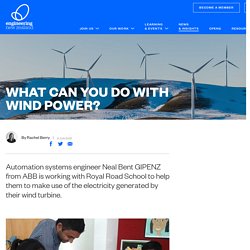
This low decile Waitakere school is an Enviroschool with a native tree nursery and vegetable gardens. In 2010 their Transpower Neighbourhood Engineers Awards project looked at finding an "eco" solution for pumping water from their rainwater tank to the shade house. With help from engineer Juan Pretorius MIPENZ, the students researched options for using a wind turbine to generate the necessary electricity.
The money they won from the Transpower Awards, plus funding from the Auckland Council’s Environmental Initiatives Fund, enabled the school to install a wind turbine, which has been in use since the end of 2013. A new group of students have started a project for this year’s Awards, looking at how the school can use the surplus electricity generated by the wind turbine. Project Noah Review for Teachers. Seaweek – Kaupapa Moana 2019. Aandeedu. Our ambassadors - Curious Minds, He Hihiri i te Mahara. Engineering Everywhere Curriculum Units.
The Search for Real-World STEM Problems. —Courtesy of Allison Shelley/The Verbatim Agency for American Education: Images of Teachers and Students in Action By Anne Jolly If you want to engage students and get them excited about what they are learning in science, technology, engineering, and mathematics classes, ask them to tackle a real-world problem. Then watch their amazement as they realize what they are learning in class actually has real-world applications. Working on solutions to real-world problems is the heart of any STEM investigation. These solutions may include devices and designs that improve our lives, fulfill our needs or wants, and make our world better. Perhaps the most important consequence of students working on real problems is that they begin to develop empathy—a sense that there is something worth dedicating their efforts to outside of themselves.
nQuire-it — join missions to explore your world. Young Citizen Inquiry. Join missions to explore your world. Mountains to Sea Conservation Trust - About Us. The Northland-based Mountains to Sea Conservation Trust (CC23406) was established in 2002, as a charitable umbrella and support organisation for the Experiencing Marine Reserves (EMR) marine education and Whitebait Connection (WBC) freshwater education programmes.
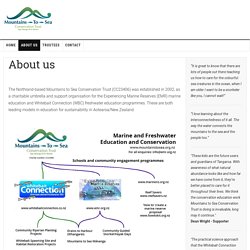
These are both leading models in education for sustainability in Aotearoa/New Zealand. The Trust sees education as a vital part of society and central to all environmental restoration. Both programmes involve young people, their parents and the wider community. Skype in the Classroom - Overview. Resources: lesson plans, videos - Nature Works Everywhere. Data Nuggets. Kids' invention helps scientists tackle kauri disease - Curious Minds, He Hihiri i te Mahara. Scientists now have an improved kit for checking whether streams are carrying a water mould that kills kauri trees, thanks to a new design developed and tested by primary school students.
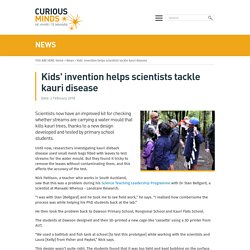
Until now, researchers investigating kauri dieback disease used small mesh bags filled with leaves to test streams for the water mould. But they found it tricky to remove the leaves without contaminating them, and this affects the accuracy of the test. Take action: Toyota Kiwi Guardians. Astronomy Citizen Science Projects – Our Wide Sky. Auckland Council on Sustainable Living Programme.
Sign up for access to the study guide Latest workshops on Sustainable Living On Auckland's North Shore the Kaipatiki Community Facilities Trust has been offering free Sustainable Living workshops on energy, waste, gardening and water, all funded by the Kaipatiki Local Board.
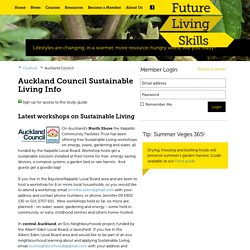
Workshop hosts get a sustainable solution installed at their home for free: energy saving devices, a compost system, a garden bed or rain barrels. And guests get a goodie bag! If you live in the Bayview/Kaipatiki Local Board area and are keen to host a workshop for 6 or more local households, or you would like to attend a workshop, email jennifer.a.kerr@gmail.com with your address and contact phone numbers, or phone Jennifer 09 6300 130 or 021 0707 601. In central Auckland, an Eco Neighbourhoods project, funded by the Albert-Eden Local Board, is launched!
Community shellfish monitoring. Community shellfish monitoring Auckland Council, Waikato Regional Council, and the Department of Conservation (DoC) support community groups, schools and iwi to carry out annual shellfish monitoring.
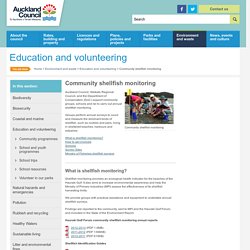
Groups perform annual surveys to count and measure the dominant kinds of shellfish, such as cockles and pipis, living in sheltered beaches, harbours and estuaries. New Zealand’s National Science Challenges — Science Learning Hub. Making and using a quadrat — Science Learning Hub. Citizen Science Project - NZ Landcare Trust. 'Citizen Science Meets Environmental Restoration: measuring success through monitoring' is a three year project funded with support from MfE's Community Environment Fund, that aims to improve the leadership, strategic direction and coordination of citizen science in New Zealand.
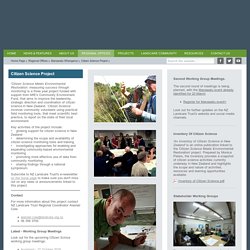
‘Citizen Science’ involves community volunteers using practical field monitoring tools, that meet scientific best practice, to report on the state of their local environment. Key activities of the project include: • growing support for citizen science in New Zealand • determining the scope and availability of citizen science monitoring tools and training • investigating approaches for enabling and expanding community-based environmental monitoring • promoting more effective use of data from community monitoring • sharing findings through a national symposium.
About: Participatory Science Platform - Science Into Action. Participatory Science Platform (PSP) – What is it?
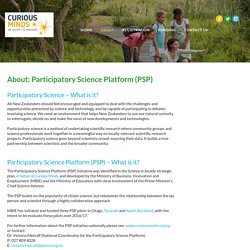
The Participatory Science Platform (PSP) initiative was identified in the Science in Society strategic plan, A Nation of Curious Minds, and developed by the Ministry of Business, Innovation and Employment (MBIE) and the Ministry of Education with close involvement of the Prime Minister’s Chief Science Advisor. The PSP builds on the popularity of citizen science, but rebalances the relationship between the lay person and scientist through a highly collaborative approach. MBIE has initiated and funded three PSP pilots in Otago, Taranaki and South Auckland, with the intent to be evaluate these pilots over 2016/17. For further information about the PSP initiative nationally please see: www.curiousminds.nz/psp or contact: Dr. Home - FPSNZ FPSNZ. Games for Change. TOM - Tournament of Minds. A Community for Naturalists · NatureWatch NZ.
Student Model Rocketry Contest. Zooniverse - Real Science Online. 199 labs turned him down. This teen made a groundbreaking discovery at the 200th. About. Science Projects. Build Model Atoms and More on the NOVA Elements App. NOVA Elements for iPad is an excellent iPad app for helping students learn about the periodic table of elements.
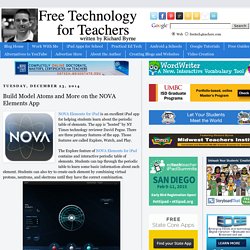
The app is "hosted" by NY Times technology reviewer David Pogue. There are three primary features of the app. Those features are called Explore, Watch, and Play. The Explore feature of NOVA Elements for iPad contains and interactive periodic table of elements. Students can tap through the periodic table to learn some basic information about each element. The Watch feature of NOVA Elements for iPad contains twelve short video clips in which David Pogue explains some of the elements and how they are used in consumer products.
The Play feature presents students with common consumer goods like watches and tee shirts.